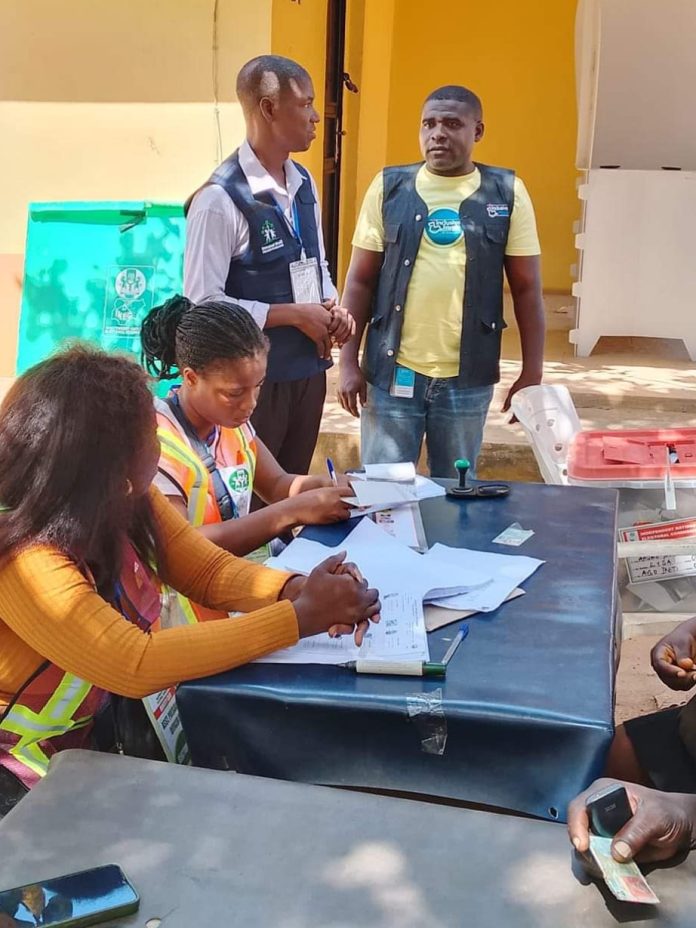In a significant step towards inclusive democracy, the Inclusive Friends Association (IFA) actively observed the Ondo State 2024 Off-Cycle Governorship Elections, focusing on the participation and experiences of Persons with Disabilities (PWDs). Collaborating with Kimpact Development Initiative (KDI), which deployed over 3,000 election observers, IFA deployed 66 PWD observers across polling units to assess the accessibility and inclusiveness of the electoral process.
Observing Through a Unique Lens
IFA’s innovative approach involved recruiting PWD observers who were also registered voters at their respective polling units. This dual role provided a firsthand perspective of the electoral experience for PWDs, ensuring that the findings reflected the lived realities of voters with disabilities.
Observers were strategically assigned to polling units where the Independent National Electoral Commission (INEC) committed to deploying assistive materials, as guided by its data on PWD voters. Additional data from KDI’s observer network enriched IFA’s insights, enabling a comprehensive analysis of the deployment of assistive materials, polling unit accessibility, and the implementation of inclusive policies such as priority voting.
Key Findings
Availability of Assistive Materials
While INEC demonstrated a commitment to disability inclusion through the deployment of assistive materials, the findings revealed gaps in their availability and utilization:
- Forms EC40H and EC30E PWD: These forms were available in 98% of polling units observed.
- Braille Ballot Guides: Only 37% of polling units had this critical tool for voters with visual impairments.
- Magnifying Glasses: Deployed in 59% of polling units, these materials supported voters with low vision.
However, the utilization of these materials was limited, largely due to the low turnout of PWD voters and a general lack of awareness about their availability.
Polling Unit Set-Up and Accessibility
IFA’s observers assessed the physical accessibility of polling units and their suitability for PWDs:
- Accessible Locations: 68% of polling units were set on flat surfaces, facilitating access for wheelchair users and individuals with mobility challenges. Some polling units further enhanced accessibility by strategically positioning voting cubicles near ramps.
- Overall Accessibility: Despite these efforts, only 35% of polling units were fully accessible, highlighting the need for improved infrastructure to accommodate all voters with disabilities.
Priority Voting and Documentation
Priority voting, a critical measure for PWDs and other vulnerable groups, was inconsistently implemented:
- Priority Voting: Observed in 70% of polling units, priority voting was extended to PWDs, pregnant women, and elderly voters. However, 30% of polling units failed to adequately enforce this policy.
- Separate Queues: Due to low voter turnout, separate queues for PWDs were not created in most polling units, though priority voting ensured they faced minimal delays.
- Documentation: PWD participation was recorded on Form EC40H in only 20% of polling units, indicating a need for better documentation practices to accurately reflect voter demographics.
Recommendations
While the elections marked progress in disability inclusion, IFA identified several areas for improvement:
- Improve Accessibility Infrastructure: INEC should ensure all polling units are situated on flat surfaces and equipped with ramps or other necessary infrastructure.
- Expand Assistive Materials: Braille Ballot Guides, magnifying glasses, and other tools should be made available at all polling units.
- Enhance Voter Education: Awareness campaigns should inform PWDs about the availability of assistive materials and encourage their participation in elections.
- Enforce Priority Voting Policies: INEC must ensure consistent implementation of priority voting and establish separate queues for PWDs and other vulnerable groups.
- Strengthen Data Collection: Accurate data on PWDs is essential for targeted deployment of assistive materials and resources.
- Collaborate on Accessibility: INEC should partner with relevant government agencies to improve the physical accessibility of polling units.
- Inclusive Observer Training: Observers should be equipped with skills to effectively deploy and assess assistive materials, with training sessions led by disability organizations.
Reflecting on Progress and Gaps
The Ondo State 2024 Governorship Elections demonstrated a growing commitment to inclusive electoral practices, with notable strides in deploying assistive materials and accommodating PWDs. However, the findings also revealed significant gaps, particularly in the accessibility of polling units and the consistent implementation of inclusive policies.
A Call to Action
Grace Jerry, Executive Director of IFA, emphasized the importance of addressing these challenges to ensure full participation for PWDs in future elections. “The progress made is commendable, but our democracy can only be truly inclusive when every voter, regardless of ability, can participate without barriers,” she stated.
Molly Joshua, IFA’s Director of Programs, echoed this sentiment, urging stakeholders to build on the gains of this election. “From voter education to infrastructure development, we must take a holistic approach to disability inclusion in our electoral processes,” she said.
Conclusion
As Nigeria moves towards a more inclusive democracy, the lessons from the Ondo elections underscore the need for continued advocacy and collaboration. IFA remains steadfast in its commitment to promoting inclusive practices, ensuring that PWDs are not only included but empowered in the democratic process.
The Ondo elections have shown that progress is possible, but the journey toward full inclusion is far from over. With sustained effort and collective will, a truly inclusive electoral system can become a reality for all Nigerians.
Signed:
Grace Jerry
Executive Director, Inclusive Friends Association
Molly Joshua
Director of Programs, Inclusive Friends Association


